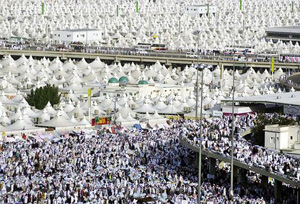Jeddah, Aug 18: The Haj Ministry is all set to hand over accommodation blocks in Mina to low-cost Haj operators ahead of the annual pilgrimage.
The ministry, however, has still not announced the names of the operators who have been allotted the housing, which enables local pilgrims to perform Haj at reduced costs.
The Civil Defense, Saudi Electricity Company (SEC), National Water Company (NWC) and other agencies finalized site inspections last week. Haj Minister Bandar Hajar also inspected the site.
“Providers are not allowed to modify structures allotted to them and are required to provide a comprehensive security system to prevent unauthorized entry into housing units meant for low-cost pilgrims,” said Sahil Al-Sabyan, a senior official at the Haj Ministry.
Around 41,000 pilgrims within the Kingdom will be performing Haj this year under the scheme, which was introduced by the ministry last year. More than 17,000 pilgrims were able to benefit from the scheme the first time it ran.
The 50 percent reduction in the quota of local pilgrims triggered a price war last year, prompting the ministry to focus more on low-cost accommodation this year.
The 41,000 pilgrims will be distributed among 62 operators.
Many pilgrims have expressed frustration over the fact that the names of the operators of low-cost Haj has not been announced.
“I hope to perform Haj if I qualify for the low-cost category, otherwise I will just go home on vacation,” said Mohammed Ali Azad, an Indian expatriate.
“I also tried to qualify last year, but was unable to find any low-cost operators despite reading ads in the media. Unfortunately, the issue seems as unclear this year too.”
The low-cost Haj scheme is divided into eight categories, ranging from SR1,500 for an e-class package to SR7,500 for the a-class category depending on the Haj services provided in each package.
The Haj Ministry has made arrangements for a total of 168,000 to perform Haj this year.





Comments
Add new comment